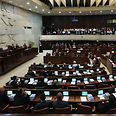
Israel's Knesset. 'It's the legislature's job to determine when an organization crosses the line'
צילום: גיל יוחנן
NGOs on confrontation line
Op-ed: There is no difference between Kahane Chai, radical group working to boycott Israel because of its Jewish identity
Edwin Black is a Jewish American journalist and writer who deals with human rights. He defines himself as "impartial"; with no agenda, with no political affiliation. In 2001, Black exposed the involvement of IBM and Western funds in Nazi Germany. The findings stirred a row, and Black turned against his will into a fighter against anti-Semitism.
About a year ago he decided to visit Israel to conduct a study on human rights. Black is considered an advocate of both – Israel and human rights. He sees no contradiction here. I told him that neither do I. He toured the country as a foreign journalist, met activists, collected documents and heard words in English in favor and against. Eventually, he published a fascinating book called "Financing the Flames."
In one of the chapters, Black describes how he sought to learn about the struggle for human rights from personal experience. The spokeswoman of B'Tselem directed him to the Friday protests at the village of Nabi Saleh . He said the protest was quiet and boring. The soldiers stood without moving, the demonstrators protested loudly but without any violence. Both sides served as extras in a film about a political struggle. Until the photographer he invited from Tel Aviv arrived.
Within seconds from the moment the camera was pulled out, the setting changed: Stones went flying, children screamed and the soldiers fired smoke grenades. Black refers to it as stage management, and his conclusions correspond with that.
Black marked the activists, and mainly their sources of funding, as the source of all evil. The motive and result of the flames on the ground. I asked him if he was aware of the Israeli dispute over the NGO law. He had no idea what I was talking about. His book targets the American audience, to make it aware of who engages in politics in the name of human rights. Without an agenda, he reiterated.
I listened to him patiently. In spite of his many visits, he has yet to learn the Israeli society. The political patterns of Right and Left make it impossible to deal with human rights without an agenda. The same applies to the discussion over the NGO law.
As opposed to the voices of protest heard in recent weeks, the NGO bill raises an important discussion in Israel. The attempt to reject the law as anti-democratic misses the point and causes us to forget the motives which led to its birth. A democratic state needs human rights organizations within it. That way, important balances are maintained in favor of minorities in the society. On the other hand, a democratic state must also beware of harming itself.
The new-old law seeks to cut tax breaks given to associations calling to put IDF soldiers on trial and boycott the State of Israel, associations which deny Israel's existence as a Jewish and democratic state, incite to racism or urge support for terror organizations. These clauses are all fit for radical right-wing associations as well as radical left-wing associations. They are as binding. There is no difference between the Kahane Chai movement, which undermined the strength of the Israeli democracy, and a radical organization working to boycott the State of Israel because of its Jewish identity. Freedom of expression is not a limitless permit. And the discussion about those who use it to act against the State is appropriate and correct. It points to the strength of democracy rather than to its weakness.
The law's problem is not how justified the claims are, but rather its populism and inaccuracy. The law fails to provide sufficient tools to measure when an organization crosses the line. This is not a matter for the court. It is the legislature's job to find the proper balance. The Zionist Left must sit with the Zionist Right and define agreed upon rules. The populism on both sides is harmful. The struggle against the forces of evil (on both sides) helps clarify positions, but is very bad for the Israeli democracy.










